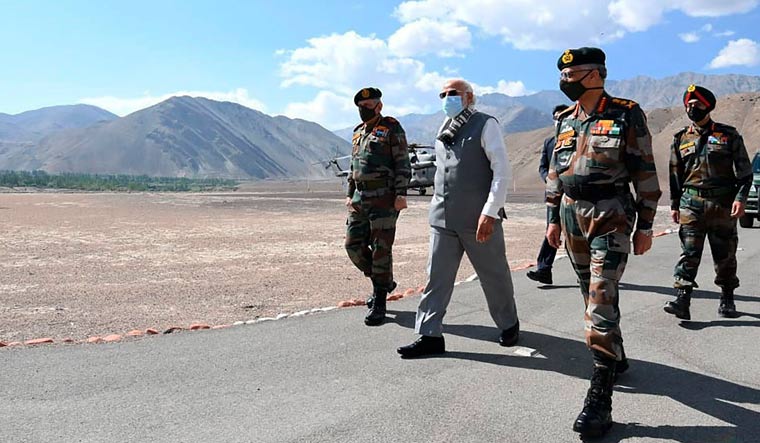As forces of India and China are working on a mechanism to disengage from the flashpoints in eastern Ladakh sector, Prime Minister Narendra Modi during his visit to Leh on Friday affirmed that India is committed to peace and friendship, but this commitment should not be seen as its "weakness".
On Friday, the prime minister, along with Chief of Defence Staff General Bipin Rawat and Army Chief General M.M. Naravane, visited Nimu in Ladakh, which is surrounded by the Zanskar range on the banks of river Indus. He was briefed by the top military commanders, including Leh-based XIV Corps GoC Lt Gen Harinder Singh, on the ground situation on the Line of Actual Control (LAC), the de facto border between India and China. Chants of Bharat Mata Ki Jai and Vande Mataram broke out when Modi arrived at Nimu.
"Today India is becoming stronger, be it in naval might, air power, space power and the strength of our Army. Modernization of weapons and upgradation of infrastructure have enhanced our defence capabilities multifold," the prime minister said while interacting with Army and ITBP personnel.
Modi's comment on modernisation came a day after the Ministry of Defence approved procurement worth Rs 38,900 crore for the armed forces, which include additional 33 fighter jets, missiles and ammunition.
During his visit, the prime minister also visited Leh military hospital where he interacted with soldiers injured during the June 15 clash in Galwan Valley. Modi recalled that Indian soldiers had a long history of bravery and competence in global military campaigns, including in the two world wars.
“The enemy has seen your fire and fury,” said the prime minister, in a direct message to China after the deadly clash in Galwan valley in which 20 soldiers were killed in action.
He said that the "time for expansionism is over and this is the era of development".
Immediately after PM's remarks, spokesperson of Chinese Embassy in India Ji Rong said, "China has demarcated boundary with 12 of its 14 neighboring countries through peaceful negotiations, turning land borders into friendly cooperation bonds. It's groundless to view China as expansionist, and exaggerate and fabricate its disputes with neighbours."
In his address, the prime minister also touched upon the steps taken for the well-being of India’s forces and furthering India’s security preparedness. This includes ensuring availability of modern weaponry, increased border infrastructure, border area development and expanding the roads network.
Modi said that the expenditure on border infrastructure has been "enhanced three times", in an apparent reference to the 73 strategic roads along the India-China border, which were sanctioned in 2006. After years of dilly-dallying, 75 per cent of these roads now are ready and plans are on war-footing to complete the remaining work by the end of next year. This has annoyed Beijing which has adopted the strategy of robust overland infrastructure.
During the interaction with troops, Modi recalled the greatness of Ladakh’s culture as well as the noble teachings of Kushok Bakula Rinpoche. He described Ladakh as a land of sacrifice and a land that has given several patriots. He affirmed that the people of India are inspired by the teachings of Gautama Buddha, for whom courage is linked to conviction and compassion.
Also read
- Trump vs China could mean Rs 2 lakh crore windfall gain for India
- Beyond border acrimony, India and China agree to look at big picture
- ‘Need to focus on cooperation rather than conflict’: Rajnath Singh meets Chinese defence minister
- Jaishankar, Wang Yi discuss resuming India-China direct flight, Mansarovar Yatra



